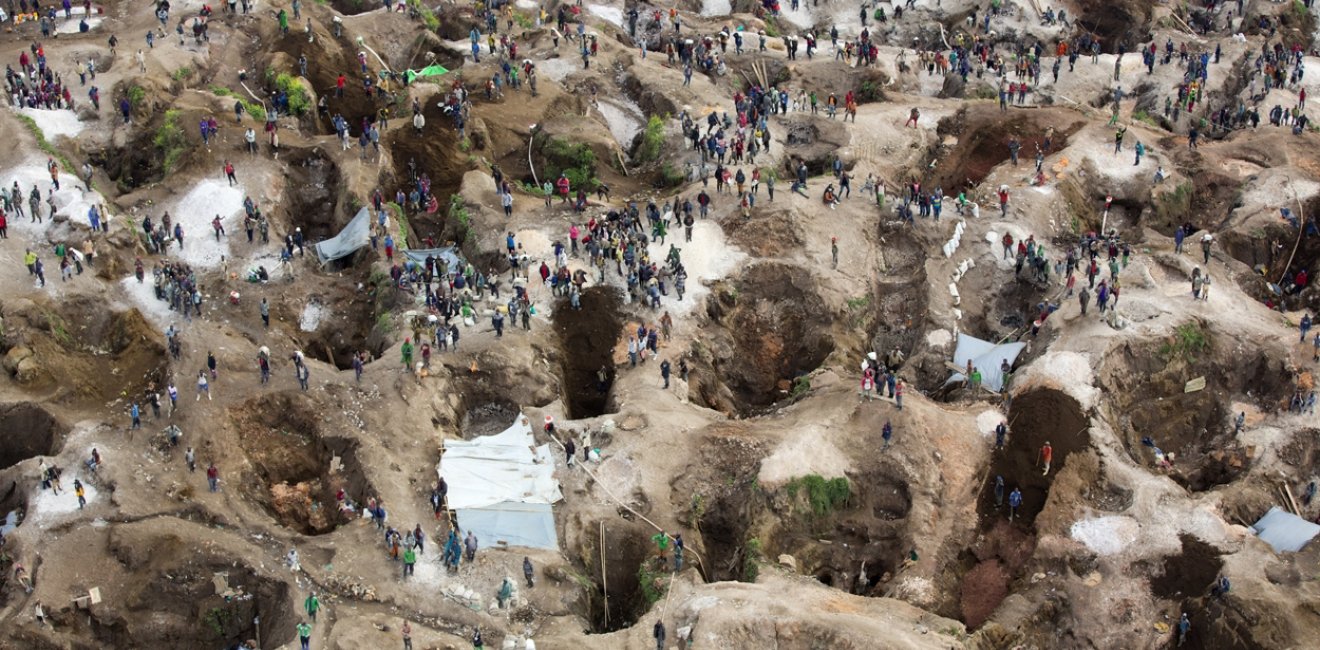
A blog of the Africa Program
Last year, many took to social media using the hashtag #NoCongoNoPhone to fight against the cobalt supply chain that fosters child labor and the exploitation of small-scale artisanal miners. The Democratic Republic of Congo (DRC) has some of the world’s most valuable minerals, such as copper, gold, coltan, cobalt, and diamonds, and has the earth's second-largest forest after the Amazon. Yet, the DRC is one of the world's poorest countries as poverty and humanitarian crises plague its citizens.
More than half of the world’s cobalt resources are located in the DRC, and over 70% of the world’s cobalt mining occurs there. Artisanal miners produce 20% of the country’s cobalt output. The remainder comes from foreign-owned firms, primarily Chinese, whose rechargeable battery industry accounts for around 60% of global cobalt demand.
Cobalt is an essential raw material used by large tech companies for rechargeable lithium-ion batteries, electronic devices, and electric cars. However, the DRC’s valuable cobalt industry comes at a price: extraction of the mineral is linked to child labor, safety risks, environmental abuses, and corruption. If the DRC fails to adopt and enforce stricter regulations to protect small-scale miners, these trends will increase alongside the technology-driven surge in cobalt demand, projected to grow by 60% by 2025.
Child Labor
Small-scale mining in the DRC involves people of all ages, including children, obligated to work under harsh conditions. Of the 255,000 Congolese mining for cobalt, 40,000 are children, some as young as six years. Much of the work is informal small-scale mining in which laborers earn less than $2 per day while using their own tools, primarily their hands.
As global demand for Congolese mineral resources increases, so do the associated dangers that raise red flags for Congolese miners' human rights.
Numerous big-tech companies like Apple, Alphabet (Google’s parent company), Dell, Microsoft, and Tesla were cited in a lawsuit over deaths and serious injuries sustained among child laborers in DRC cobalt mines. The attempt to hold big-tech accountable is a positive step that must be accompanied by increased public awareness of child labor exploitation and the deplorable work conditions of small-scale mining.
Environmental Implications
Growing global demand for cobalt implies that Congo’s environment will suffer, especially if precautions are not taken to ensure sustainability. The extraction of DRC mineral resources includes cutting down trees and building roads, negatively impacting the environment and biodiversity. Moreover, although cobalt is a crucial component in global greening and renewable energy, its quick extraction contributes to global warming. Cobalt mining operations generate incredibly high carbon dioxide and nitrogen dioxide emissions and substantial electricity consumption. These emissions contribute to the fact that Africa produces five percent of carbon dioxide emissions globally.
Big Tech Efforts to Formalize Artisanal Small-Scale Mining Sector
In response to these pressures, several global big-tech companies, including BMW Group, BASF, Samsung SDI, and Samsung Electronics, launched Cobalt for Development in 2019 to support ethical and safer practices in the DRC’s cobalt mining industry. Volkswagen joined the project in 2020. With the aim of making artisanal small-scale cobalt mining more sustainable, Cobalt for Development will run for an initial period of three years to analyze how the workers’ lives, work environment, and communities can be improved. This initiative solicits local input to ensure sustainability and enhance local ownership. Cobalt for Development is carrying out impactful activities that have benefited over 1,800 community members in the DRC’s Kisote and neighboring areas by increasing access to education and holding workshops on topics ranging from bread-making to women’s rights, positive parenting, and conflict resolution. This approach helps parents diversify their incomes and reduce or eliminate families’ reliance on child labor.
Tesla Inc., projected to need more cobalt as it expands production and sales in Europe and China, joined the fledgling Fair Cobalt Alliance in 2020. This new initiative aims to support artisanal miners, as carmakers and mining companies seek to reassure customers they are adhering to appropriate safety regulations. The Alliance’s stated goal is to improve workers’ conditions and cease child labor in DRC cobalt mines. Glencore, an Anglo-Swiss multinational commodity trading and mining company, has also joined the initiative. Tesla also announced in 2021 a pilot blockchain program to trace cobalt from mine to product as a way of introducing transparency into the supply chain.
Out of fear of being associated with mining firms that access cobalt through child labor, some individual tech companies have decided to stop purchasing from small-scale miners altogether. This strategy threatens livelihoods in many DRC communities that depend heavily on small-scale mining for jobs and income.
This, in turn, underscores the importance of fully formalizing the DRC’s small-scale cobalt mining industry, which accounts for 20% of the country’s cobalt output.
With the assistance of multinational companies in the big tech and other sectors, measures can be taken to make cobalt extraction sustainable and safer for the communities mining the mineral.
This assistance will enable Congo's small-scale miners to be better compensated, have the proper equipment, and operate safely while eradicating child labor. An additional benefit is that artisanal miners can work small deposits that would be uneconomical for large mining companies.
Call to Action
Informed consumers need to be aware of the technology sector’s impact on the Congolese people and the environment. The explosive growth in worldwide cobalt is driven by consumers around the globe and has global environmental effects. Ensuring workers’ safety and protecting the environment will benefit not only Congolese miners but also humankind’s efforts against global warming. Consumers must be aware that quickly disposing of old cell phones and other gadgets powered by cobalt to acquire the latest models can come at the expense of others’ lives. One’s concern for Congolese children working in the mines should not stop at online activism; it must extend to real-world choices.
Author


Africa Program
The Africa Program works to address the most critical issues facing Africa and US-Africa relations, build mutually beneficial US-Africa relations, and enhance knowledge and understanding about Africa in the United States. The Program achieves its mission through in-depth research and analyses, public discussion, working groups, and briefings that bring together policymakers, practitioners, and subject matter experts to analyze and offer practical options for tackling key challenges in Africa and in US-Africa relations. Read more

Explore More in Africa Up Close
Browse Africa Up Close
The Innovative Landscape of African Sovereign Wealth Funds





